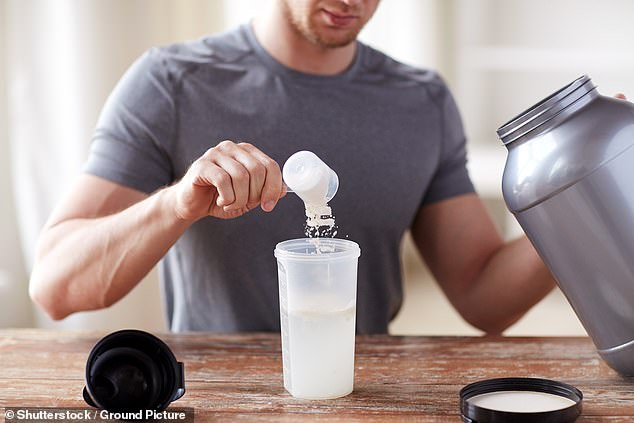Published: | Updated:
Adding more creatine to your diet could help cure chronic constipation and reduce the risk of deadly bowel cancer, a promising new study has revealed.
Over the last 30 years, young diagnoses of the disease have shot up by an alarming 80 per cent across the globe, figures suggests.
Scientists have suggested a host of factors are likely behind the phenomenon—from increasing pollution to rising obesity, and even chronic constipation.
But now, US researchers are claiming that simply adding more animal-derived creatine to your daily diet could slash the risk of constipation by 19 per cent.
Creatine is typically considered a fitness supplement, taken by athletes and avid gym goers to help power high intensity training sessions as well as those requiring sustained energy such as tennis players.
However, doctors and wellness experts have become increasingly curious about its potential health benefits outside of the gym.
Creatine is a compound that naturally occurs in the body, and is produced by the liver, kidneys and pancreas.
We can also get it from dietary sources such as red meat, fish and chicken.

The compound acts as a quick fuel source for muscles, helping restore levels of adenosine triphosphate (ATP)—which plays a crucial role in muscle metabolism.
And whilst creatine is often associated with fitness fanatics looking for an edge, experts now say dietary creatine could help aid digestion.
In the current study, US researchers analysed over 10,700 adults from the National Health and Nutrition Examination Survey (NHANES) over five years.
The experts extracted data on dietary creatine intake to see whether this had an effect on bowel habits, taking into consideration potentially confounding factors such as age, sex, and physical activity levels.
They found that those who consumed more creatine through their diet were significantly less likely to suffer from chronic constipation.
A ten-fold increase in absolute creatine intake was associated with a 19 per cent lower risk of constipation.
Constipation is a common condition that affects people of all ages, making it harder to have regular bowel movements and fully empty the bowels.
Common symptoms also include abdominal pain, bloating or nausea.

Chronic constipation is estimated to affect up to 15 per cent of the world’s population.
Researchers found that the benefits of creatine were more profound in male participants, smokers, drinkers and those younger than 48-years-old—which could help treat the epidemic in young people.
Whilst bowel cancer is caused by a number of factors, according to Mr Haney Youssef—a colorectal surgeon who was not involved in the current study— constipation significantly increases the risk of the disease.
According to the study, creatine—like fibre—helps maintain regular bowel movements and optimal gut functioning.
‘Maintaining regular bowel movement is essential,’ Mr Youssef said. ‘This reduced the time potential toxins spend in contact with the bowel wall.
‘This is crucial because prolonged contact with harmful substances can damage the delicate lining of our colon and rectum.’
The researchers, led by Professor Baohua Zheng, concluded: ‘Our study offers valuable insights into the potential role of dietary creatine in gut health.’
However, they acknowledged some limitations of the study, including the use of self-report data that could confound results.

Red meat, chicken and fish are all good sources of absolute creatine, buy experts have long warned against eating red meat due to increased cancer risk.
And whilst diet alone should provide all the creatine the body needs, the fitness-minded often take it in supplement form to optimise their workouts.
Despite being one of the most researched supplements available, creatine is known to cause a number of minor side-effects from bloating to abdominal pain—especially when taken in high doses, a practice dubbed ‘loading’ by fitness influencers.
Dr Avinish Reddy, a longevity expert, said there is no need for this phase, with higher doses putting unnecessary strain on the kidneys as they struggle to filter out excess waste.
The study comes as amid a growing body of research that has uncovered how emulsifiers, typically found in synthetic creatine supplements, could be an overlooked contributor to bowel cancer.
Studies have found that these additives can wreak havoc on the gut microbiome, causing bloating, bowel changes and inflammation linked to cancer.
Dr Maria Abreu, president of the American Gastroenterological Association, previously told the Daily Mail: ‘Chronic inflammation leads to colon cancer, and I suspect that’s transformative in this new rise of young people developing colon cancer,’ she told this publication previously.’
‘One of the things that has changed very dramatically in our food supply is the addition of emulsifiers.’
Common symptoms of the disease include persistent changes in bowel habits, such as diarrhoea or constipation, needing or feeling the need to empty your bowels more or less frequently, blood in the stool, abdominal pain, unexplained weight loss and extreme fatigue.
However bowel cancer can also appear with no symptoms until it has spread, when it becomes harder to treat.
While the disease is known to be linked to obesity, experts have noted the disease is increasingly affecting otherwise fit and healthy patients.
Some experts believe the explanation must lie in environmental factors young people have been exposed to more than previous generations.
While no ‘smoking gun’ has been found, there are multiple theories including modern chemicals in diets, microplastics, and pollution.
Around 44,000 cases of bowel cancer are diagnosed every year in the UK, claiming the lives of almost 17,000 patients each year.
Overall, just over half of bowel cancer patients are expected to be alive 10 years after their diagnosis.
Cancer Research UK estimates that more than half—54 per cent—of bowel cancer cases are preventable.








